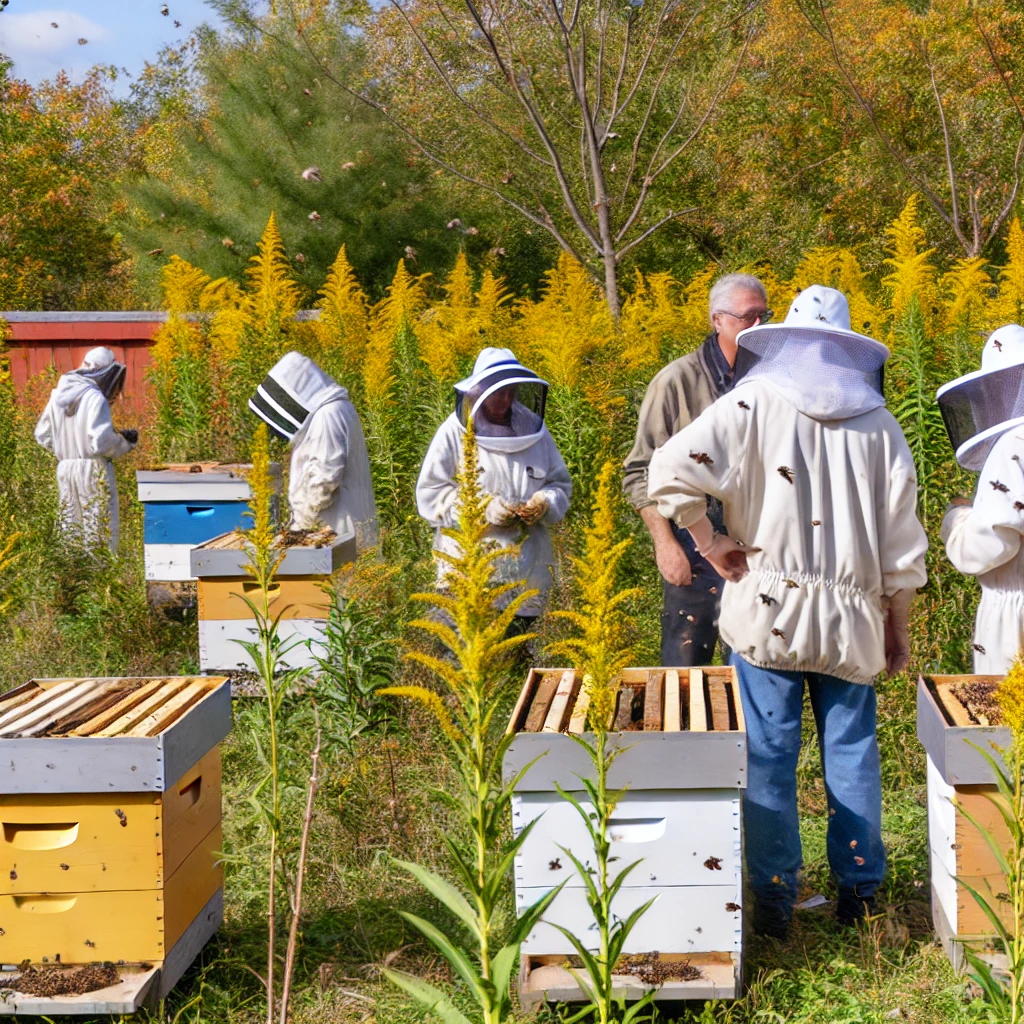
By Rahul
ESCANABA — The Bay de Noc Beekeeping Club is a thriving nonprofit organization in our community, uniting individuals with a shared passion for raising honeybees. Whether you’re an experienced beekeeper or someone curious about starting, this club welcomes members of all ages and skill levels. Some members are seasoned sellers of honey, others are involved in the transportation of bees for pollination across the nation, while some simply maintain a hive or two in their backyard. The one thing they all have in common is a willingness to share knowledge and ideas.
For those traveling through Escanaba, you may have noticed beehives nestled in the Community Garden, carefully managed by the club members.
Before the club’s formation, many beekeepers from Delta County traveled to Marquette for meetings. Jessica LaMarch, who founded the Bay de Noc Beekeeping Club, recalls how it all began. She had approached Joel Lantz of the Superior Beekeeping Club, asking if he could consider holding meetings a bit earlier to avoid her traveling between Marquette and Escanaba in the dark.
“Joel kindly encouraged the idea of creating a club in the Escanaba area since he knew there was significant interest here,” LaMarch explained. “I posted a couple of feelers on Facebook, and over 100 people expressed interest in attending. Our first meeting attracted around 40 people, and we’ve continued to grow since then.”
The club’s journey began seven years ago with educational sessions at Bay College aimed at introducing the public to beekeeping. The group hosted various workshops, from demonstrating beekeeping equipment to featuring guest speakers who shared unique insights, such as how to make mead from honey.
“Our mission is simple: to educate and share the love of beekeeping,” said Shaun Carignan of the Bay de Noc Beekeeping Club, a 501(c)(3) nonprofit organization.
In 2020, the club shifted to more hands-on experiences, adapting to the challenges of the COVID-19 pandemic by meeting outdoors. Despite social distancing guidelines, the club members gathered at bee yards three or four times that year.
Today, the club’s meetings continue to be held outdoors during the summer, with spring gatherings at Bay College. On the last Wednesday evening of each month, beekeepers from across the Delta County area—from Manistique to Marinette—come together, often at a member’s home or the Escanaba Community Garden, where a few club members maintain hives. The club continues to welcome guest speakers and actively participate in conferences.
This is the third consecutive year that the Bay de Noc Beekeeping Club has maintained hives on the northern edge of the Escanaba Community Garden, which is part of the Michigan State University Extension. Carignan praises the location, as it provides ample space away from the garden plots while offering the bees a wealth of flora to forage from.
“This is goldenrod—bees absolutely love it,” Carignan said as he pointed to the dense thicket of tall plants near the hives. A honeybee buzzed around his gloved hand, drawn to the vibrant yellow blooms. “Anyone interested in observing the bees in action can visit the garden and watch them feasting on the goldenrod.”
While many members don their bee suits during hive inspections, the atmosphere was calm during a recent gathering. Carignan remarked that one of the hives was among the friendliest he’d encountered.
Conversations naturally shifted to the temperaments of different hives, highlighting how each has its unique personality, much like their keepers.
“There’s a saying in beekeeping: ‘If you ask 10 beekeepers, you’ll get 11 different opinions on what to do,’” shared Michelle Guzzetta. “Everyone has their own methods based on what has worked for them. There’s no single ‘right’ way.”
Guzzetta also spoke about the meditative nature of beekeeping, noting, “If you’re anxious, the bees will sense it and chase you. You have to remain calm, take deep breaths, and find peace in the process. It’s both challenging and rewarding.”
The Bay de Noc Beekeeping Club is a welcoming place for both newcomers and seasoned beekeepers. John Duke, a recent transplant from Chicago now living in Brampton, has found the club’s support invaluable in his first year of beekeeping. Meanwhile, John Petr, who manages 11 apiaries across Escanaba, Stonington, and beyond, continues to refine his craft by attending bee meetings to learn about challenges faced by keepers in different regions, including Florida.
Bruce Kelm, one of the club’s founding members, praised the Heroes to Hives program for veterans, led by Dr. Adam Ingrao. Other members regularly participate in conferences in Marquette and Iron Mountain, fostering ongoing discussions and collaborations.
“If someone has a question, we’re all here to help,” said Kelm. “If a member needs assistance with their hives, another beekeeper will lend a hand. We’re truly in this together.”
The Bay de Noc Beekeeping Club maintains an active presence on Facebook and can be reached via email at baydenocbeekeepingclub@gmail.com.
